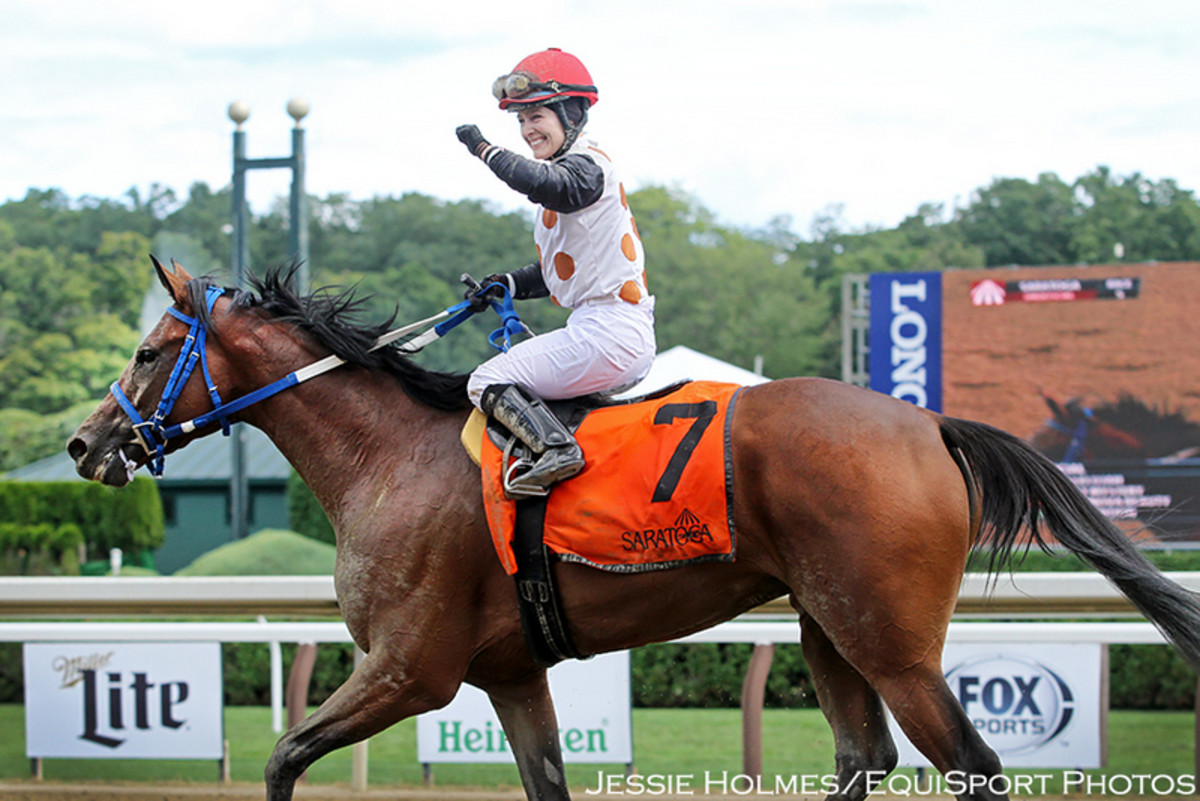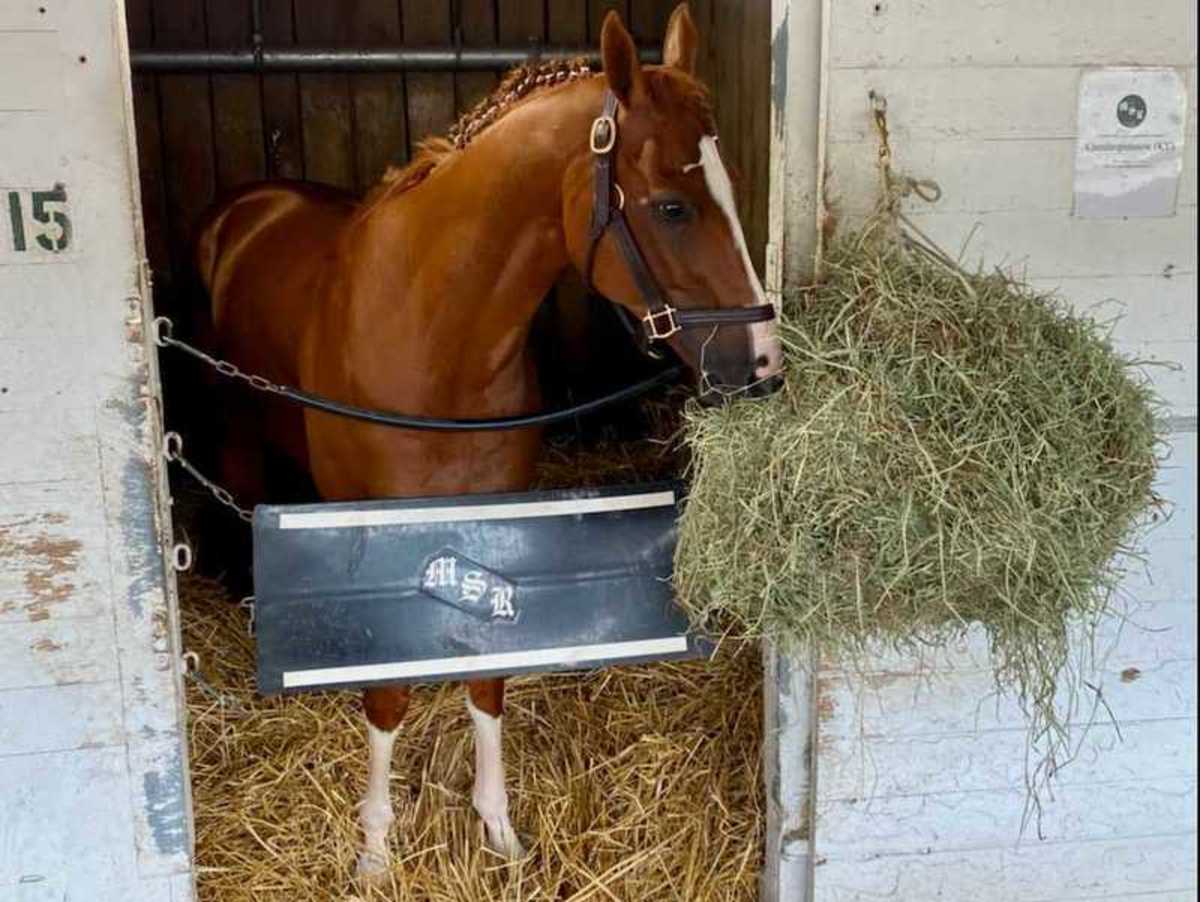Like father, like son?
Bill and Riley Mott sure hope so as Riley takes initial steps toward launching his training career this winter at Oaklawn Park.
Riley has applied for 20 stalls at Oaklawn and is confident he will come close to filling them. He already has secured horses from some clients of his Hall of Fame father while recruiting new owners willing to gamble on a young talent who appears to have every ingredient necessary for success.
“It's something I've been looking forward to since I was a little kid,” said Riley, 30. “I have a lot of feelings about it – excited, anxious, confident, ready.”
Riley has worked closely with his father as his assistant since 2014. He will remain with the operation beyond the Saratoga meet, until the horses he oversees at the upstate New York track are ready to ship to Florida in early November.
Then Riley, his wife, Megan, their toddler, Margot, and their golden retriever, Henry, will pile into their car and head for the house they rented in Hot Springs, Ark., and a venture that holds great promise but no guarantees.
“Some people may think I have a silver spoon or whatever,” Riley said. “But the way I see it is I've had a great opportunity to learn and I'm going to try to capitalize on my opportunity.”
Bill, at 45, became the youngest trainer inducted into the National Museum of Racing's Hall of Fame in 1998. Riley, while understanding the tremendous challenges ahead, is thinking big.
“I want to be as successful as my dad. I walk through his office at home and he's got a trophy case on every wall,” Riley noted. “I want that for myself and for my family. It's motivation for me to hold to the standard that he's held throughout his career.
“While I'm not sitting here saying I'm going to be in the Hall of Fame, I certainly aspire to be. Why wouldn't you shoot for that?”

Riley's mother, Tina, began taking him to his father's barn at a young age as a way of letting him burn off seemingly boundless energy. Before long, he was insistent on going. When he was a teenager, he would sit in his father's office for hours, listening to Bill preach patience to restless owners, noting how his father dealt with staff, veterinarians, blacksmiths, jockey agents and jockeys, among others.
“I was just a fly on the wall,” he said of an education at least as important as the knowledge he gained as an economics major at the University of Kentucky.
Some race trackers urge their children to pursue other careers because of the difficult lifestyle involved. There were hockey games when Riley searched in vain to find his father in the stands. Riley regularly changed schools as his father moved from one racing circuit to another.
Bill and Tina never discouraged Riley from following what clearly became his passion at a tender age. “I've never, ever stood in his way. I wouldn't have any reason to stand in his way,” said Bill, 69. “I mean, the business has been good to me.”

According to Equibase, Mott has won more than 5,200 races while his horses have earned in excess of $314 million. He ranks sixth all-time with $19,936,900 in Breeders' Cup earnings. He is tied for sixth with fellow Hall of Famers Shug McGaughey and Richard Mandella with nine wins at the season-culminating championships.
Bill is highly respected throughout the industry. He has done everything possible to impart his philosophy to his son.
“We believe, and he believes, that the basic well-being and health of the horse are primary. They supersede everything else,” the father said. “That's what we do. We're the caregivers and we're the ones responsible for the well-being of these horses.”
Riley sounded very much like his father when he said, “There are different styles of training. We kind of let the horses tell us what they are ready for. If the horse needs time, you give it time. Sometimes it's tough to have patience. But, in the long run, it's really paid off. I've been able to see that over the years.”
Riley admits he was once a young man in a hurry for success before certain horses were.
“I think with age that is something I've become better at, having a certain amount of patience and realizing that they're not machines,” he said. “I've been able to work with horses that needed time and needed a little extra attention and I've seen the payoff of that. That is something I'm glad I improved on.”
Can Riley stay patient if he should struggle early and bills begin to mount? Can he produce enough early results to meet his goal of building his stable to 30 by the time he heads to Kentucky for next season? Can he fulfill his desire to eventually expand well beyond that?
Even as Riley assembles his staff, he knows his horsemanship and other skills will be tested as never before.
“I'm nervous because you want to do well. You don't want to fail. Failure is my biggest fear,” he said. “I think that kinds of motivates me.”
Bill feels sure that his son is ready for whatever the future brings.
“His mother, Tina, and I are very proud of him,” he said. “He's got a great work ethic and he's very responsible. If he continues to work at it as hard as he has to this point, I think he'll do fine.”
Riley will follow his father's business model as closely as possible. Just as Tina oversees the business side for Bill, Megan will fill that role for her husband of almost two years even though she lacks experience. She expects to lean heavily on her mother-in-law.
“I've got a lot to learn,” she said. “I'm looking forward to being part of the team.”
The months ahead will be charged with emotion for everyone involved. Megan said of Riley, “I don't think he is going to have any trouble with the training part. It's going to be mostly leaving his dad.”
Tom Pedulla wrote for USA Today from 1995-2012 and has been a contributor to the New York Times, Los Angeles Times, Blood-Horse, America's Best Racing and other publications.
The post Breeders’ Cup Presents Connections: Riley Mott’s Biggest Lesson From His Father Is Patience appeared first on Horse Racing News | Paulick Report.


